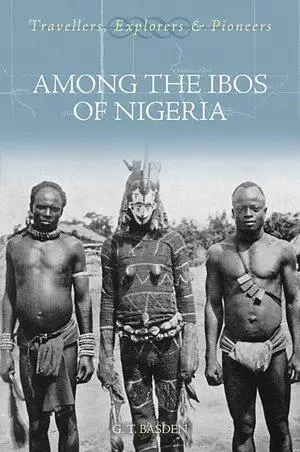By Isidore Emeka Uzoatu
Before Reverend George T. Basden arrived Onitsha at the turn of the 19th century, the Igbo people of south-eastern Nigeria had long been ‘discovered’. Thanks to the apocryphal ‘discovery of the embouchure of the Niger’ by the Lander brothers. In fact, the Royal Niger Company had been administering that general area since 1886 before its 1st January, 1900 transfer to the control of the British Government furtherance to it becoming a British protectorate in 1901. But unlike many that sailed
to the land from Britain, Basden was neither a “a palm-oil trader, colonial
functionary,” nor “a soldier on orders.” He was – to complete the quote from the book’
s introduction by Misty L. Bastian of the Franklin & Marshall College Lancaster,
Pennsylvania in the United States – driven by the mere wish “to convert pagans to
Christianity” albeit on behalf of the Church Missionary Society of the Church of
England.
First published in 1921, the modern edition was only released in Nonsuch’s
Travellers, Explorers and Pioneers imprint in 2006. The original book sprang from
interest generated back home by a magazine article written by the author following
his travels. It turns out that the young missionary was also ‘an aspiring man of
science, interested in geography and anthropology.’ This inclination serving to
lengthen the everlasting discuss about the tenuous boundaries between missionary
and colonist activity. Which the blurb goes further to support: “among other things”
Basden made maps of the Ibo hinterland that were used by the colonial
administrators, who in return must have offered him an unwritten military protection.
According to the author, Among the Ibos… was borne out of an attempt “to put in
readable English” what he had learned from the natives themselves. A fact
adumbrated in its copious subtitle: An Account of the Curious and Interesting Habits,
Customs and Beliefs of a Little-Known African People by One Who Has for Many
Years Lived Amongst Them on Close and Intimate Terms.

How intimately, indeed. Complete with thirty-seven collector’s photographs, Rev. Basden took time to comment on virtually all aspects of Igbo life he could muster.
Straight descriptions apart, he spared no time to pass judgements arrived after meticulous juxtapositions. Areas touched include the Igbo village setting, child life,
courtship and marriage, polygamy and slavery, death and burial rites, sports and pastimes, arts and crafts, trade and currency, war and weapons, etc.
According to him, the Igbo village is so picturesque, “set in the midst of beautiful surroundings and radiant with colour…” But he is equally quick to remind you that it
is “not the sweetest of places.” In fact, he ended the chapter with a hint of its alignment to that line in Reginald Heber’s storied hymn ‘From Greenland’s Icy Mountains’- “where every prospect pleases/And only man is vile.”(p.50)
Contrasts like the above make the entire book. He is at once able to distinguish the physical differentials of the eastern and western species of the people. The former’s “spare frames, spindle legs and cucumber calves” prompting thoughts of famine,
while the latter’s’ “stocky and thick-set” build suggest an “over-abundance supply of
rich food.”(p.29)
Where contrasts do not suffice, there is also an added drive to take the idiographic
for the nomothetic, perhaps to please the home audience. While admitting the “Ibo’s
capacity for work,” for instance, he moves a step further to point out that “he is of an
impatient temperament, lacks determination and perseverance, and is more or less
untrustworthy.”(p. 115) Here no effort is made at demarcation.
Discussing “Some Aspects of Religion” among the Igbo – arguably his home tuff – he
does acknowledge that “unless unlimited time and patience can be devoted to the
subject, together with much cross-questioning, backed by continual observation, no
European can ever fathom the depths of the native mind.”(p.175) However, he goes
ahead to posit that “(A)mong the Ibo people there is a distinct recognition of a
Supreme Being – beneficent in character – who is above every other spirit good or
evil.” At whose service there are “many ministering spirits whose sole business is to
fulfil His commands.”(p.177).Yet the words heathen, primitive and pagan are
repeatedly used to describe the people throughout the 250-plus page book.
Regarding “Sacrifice and Sacrifices” he affirms that like among “other primitive
peoples” the Igbo offer sacrifices “not from any desire to give, but because of the
fear that unless they are offered their lives and interests will be blighted.”(p.183). In
tandem he goes on to recount an encounter with a man who got a reprieve from
being a sacrificial human at the last minute who had no qualms accepting Christ’s
“substitutionary sacrifice” on our behalf. Compare this to his rather speedy discovery
under the title “Some points on Etiquette” that “the Ibos have clearly defined
standards of etiquette.”(p.217)
Rev. Basden was also on hand to uncover many frauds been perpetrated on the
people in God’s name at the time. Prime in this terrain was the existence of certain
local deities accredited with supernatural powers of divination that also presented a
steady source of income to their guardians. According to him, they were “deceptions
of a most impudent and specious nature, and yet they are tolerated with guileless
simplicity by those who submit to their verdict, but also cannot fathom their
mysteries.”(p.199)
The chapter on “Chiefs and their Orders” confirmed the roots of democracy among
the Igbo. Where kings existed, they were traceable to Bini influence. According to
him, “the most popular and widespread form of native government in the hinterland
has been through the administration of chiefs”; it being the “ambition of every
freeborn youth to rise to chieftainship.”(p.207) He goes on to point out that the ozo
title had by then degenerated to a money-making concern. In his words, “(i)n many
cases the holders are mere youths who inspire no feelings of respect and who
detract from the dignity…”(p.215)
Rev. Basden also pondered on the vexed issue of Igbo similitude to the Semitic.
According to him, aspects of Igbo custom – sacrifice, circumcision and language –
accentuate this affinity. It is however as it concerns music that he makes the greatest
case. According to him, Igbo music – though “savage”, the instruments “barbaric” –
still manages to “pulsate” with the effect that “(E)ven the European, if he has within
him the feeblest susceptibility to music, is liable to find the elemental forces of his
nature strangely stirred by the passionate fervour of the ‘possessed’ musicians.”(p.
160) He categorically maintains that “they must have dated back to Cain’s son Jubal
– the ‘Father of Music.’”(p.155)
All said and done, the book has its prophetic aspects. Opining that the advent of
Christianity has had a stimulating effect on “sturdy”the Igbo, he minced no words to
state that their early effort is “destined to bring forth an abundant harvest…”(p.241)
It is a must read for anyone who has wondered why the ancient Igbo walked about
naked but clothed their spirits from head to toe.
Among the Ibos of Nigeria by G.T. Basden was published in 2006 by Nonsuch,
Gloucestershire, U.K.
